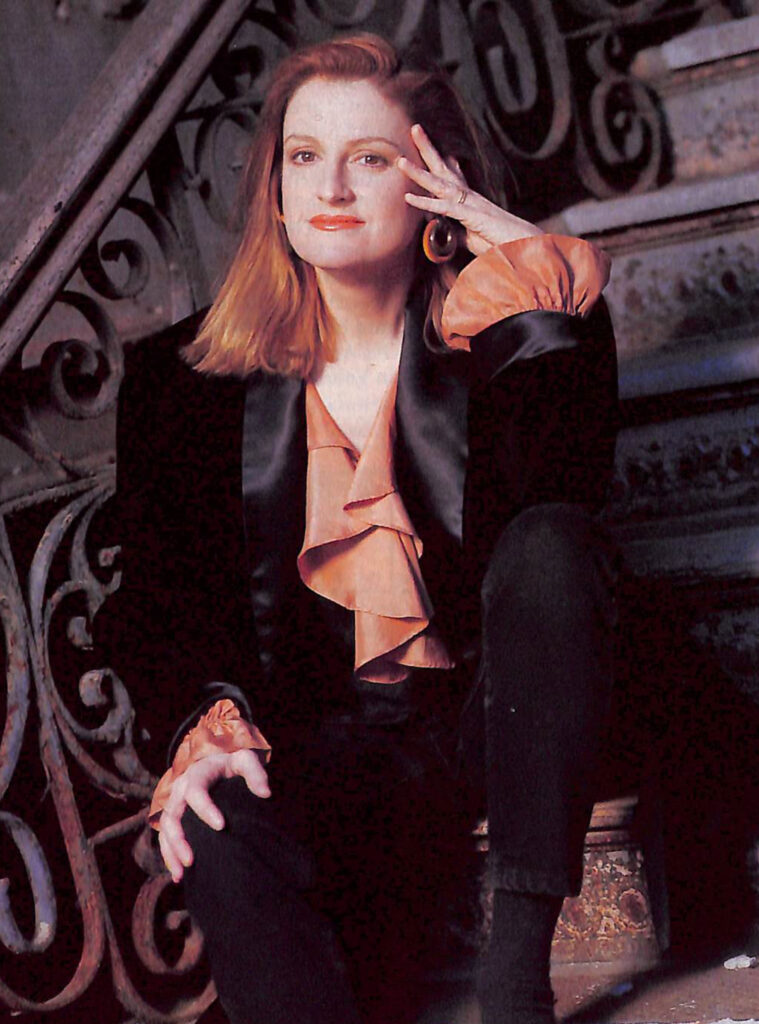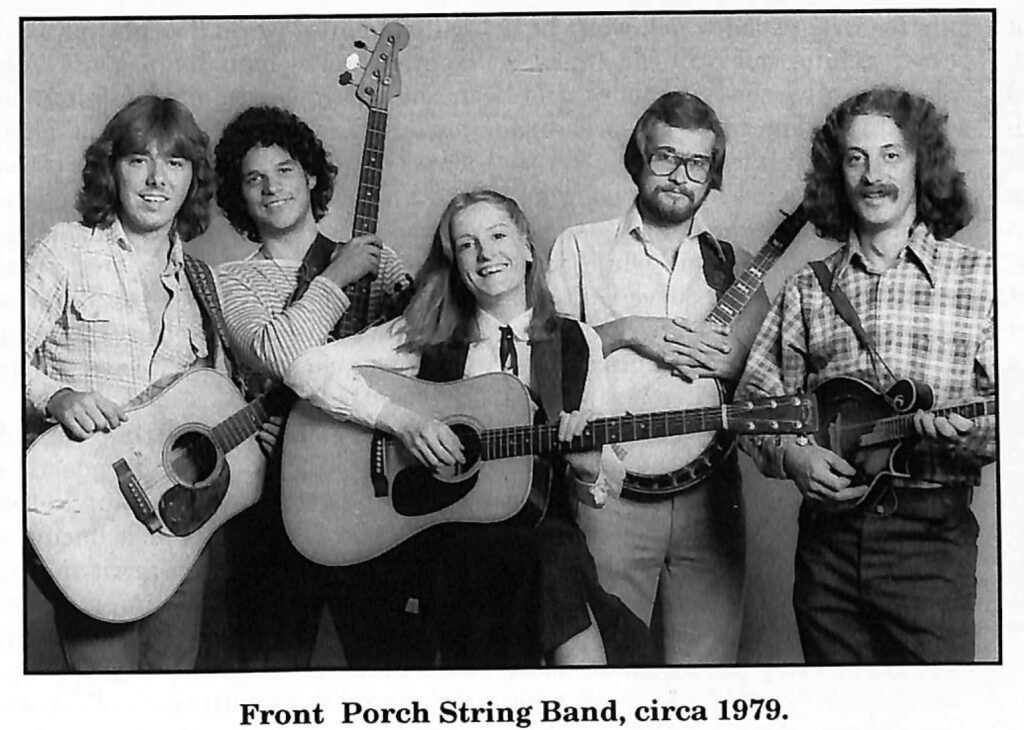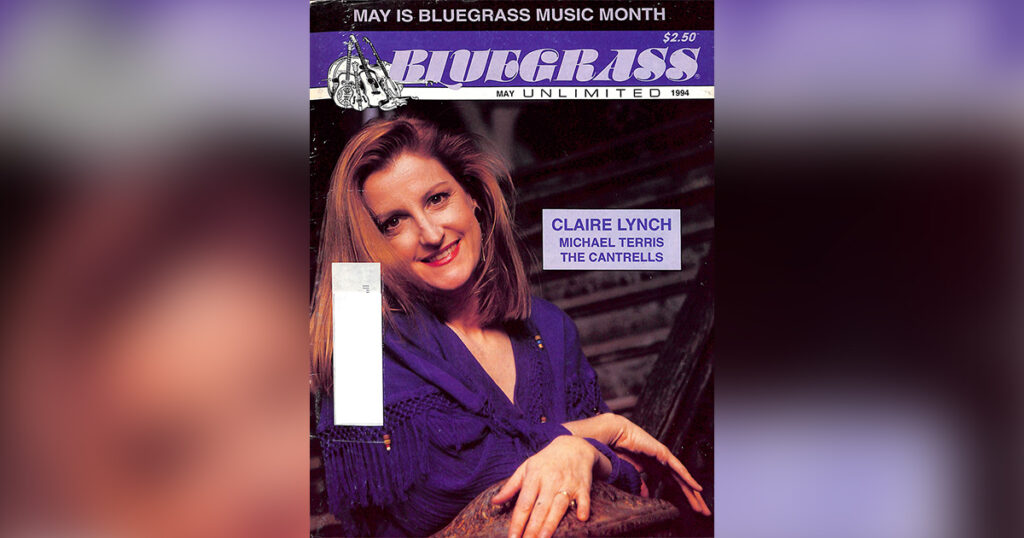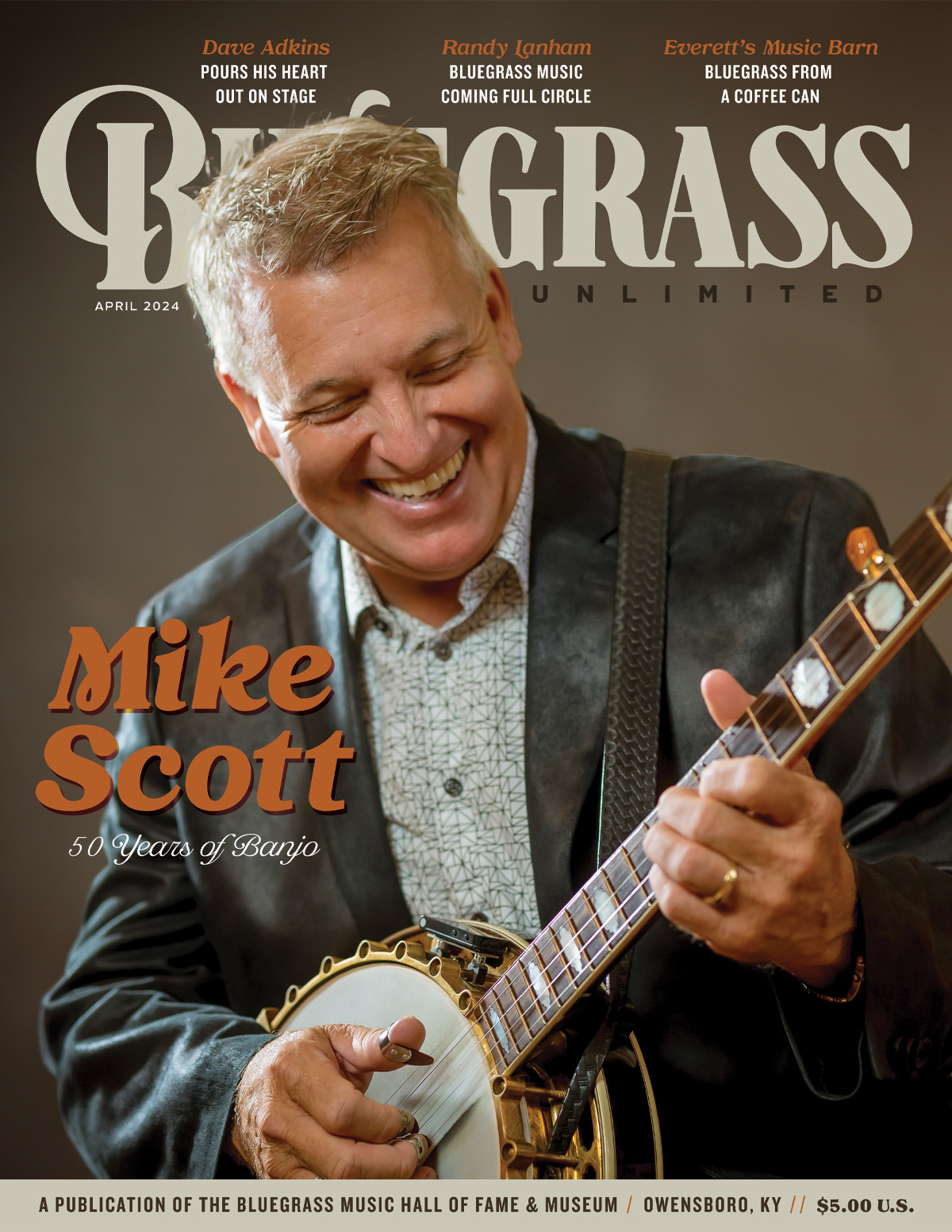Home > Articles > The Archives > Claire Lynch—In Her Own Words
Claire Lynch—In Her Own Words
Reprinted from Bluegrass Unlimited Magazine
May 1994, Volume 28, Number 11
Sometimes the best way for a writer to tell an artist’s story is to tell as little as possible, instead politely getting out of the way and allowing the artist to put things in their own words. Such is the case with Claire Lynch. The lead singer for the Front Porch String Band, Lynch has recently released her second solo album entitled “Friends For A Lifetime,” on the Brentwood Bluegrass label. (The first, “Break-in’ It,” having come out in 1984 on Leather and no longer being in print.) The album, a gospel release, has won acclaim in several music publications for its skillful blend of traditional bluegrass and more contemporary approaches, all laced together by Lynch’s plaintive, heart-stirring vocals.
Recently, we had the opportunity to ask Lynch about her life and work. For a person who while being interviewed is rather shy, giving the impression that she believes herself to have little to say, she in fact says a lot.
I was born in Poughkeepsie, N.Y., and raised in Kingston, N.Y. I lived there until I was 12, when I moved to Alabama. What I remember the most from my childhood is that laughter and music were both big in our house. My parents used to jokingly sing songs from their period, which was the big band era, and there was always church music. As a matter of fact, we managed to find a song for every occasion. If there was a conflict among us, the one who was wrong asked forgiveness, and the one who was wronged forgave. It made for a good, stable environment. My father was the inquisitive type—he was a data systems analyst for IBM, he’s retired now—and I remember a lot of our dinners winding up with getting out the encyclopedias because some question had come up. That helped make me the kind of person who isn’t afraid to ask questions and get involved with whatever is going on. Another thing I remember is when I was eight sitting at the piano with my two sisters—I’m the youngest of three children—with all three of us sitting on the bench in front of this piano with our parents standing over our shoulders and reaching over us to hit the notes on the piano and taking us through songs note for note. I sang the high lead, and even though I didn’t sing harmony at that time, I learned what it was all about. In those days, my only gigs were at home and at our church.
I used to love academics, but by the time I had finished high school my interest in them had waned and I decided that I didn’t want to go to college even though my parents had offered to send me to a great school. I took up office work after high school. I worked at an insurance agency and did well at it, working my way up the ranks. I enjoyed it, but I was at something of a crossroads as far as knowing what I wanted to do with my life. I remember talking with my dad at that time—he asked me what I wanted to do with my life and my reaction was like a balloon bursting in me and I started crying and blurted out that I wanted to work with music even though I had no idea of how to go about it. The funny thing was that it was just a short time after this that I met my future husband Larry again.
Larry and I had been buddies since the ninth grade, but we didn’t develop a relationship until a couple of years after high school when we met again. He was playing in this bluegrass band called Hickory Wind down where he was going to college at the University of Alabama at Tuscaloosa. They had a gig in Huntsville, where I was working, and that’s where I ran into him. They were playing a show with the McLain Family Band there, and the music just grabbed me. I had heard country on the radio and TV, but not a lot of bluegrass. However, when I heard that five-string and the whole band sound, I was hooked. Also, this was in 1974 when the environmental movement was just getting started, and I thought it was so cool that the music was all acoustic, all natural.
Larry and I started dating shortly after we met again, and it wasn’t long before his band invited me to start singing with it. All the members were quitting school to play full-time, which their parents all loved, and I jumped in with both feet, quitting my job as well and joining up with them. It was a crazy thing to do, but I was young and naive and I had a vision of what I wanted to do. Sometimes when you have a vision you do crazy things!

It was about a year or less after doing this that we found out there was another band named Hickory Wind in Washington, D.C., which was an old-time string band and had a couple of records out, so we changed our name to the Front Porch String Band. We landed a job in Birmingham at a club called the Oak Street Banjo Parlor as the house band, playing four or five nights a week, and then they started bringing in nationally known bands on the weekend, which was a great experience for us playing with these bands and learning from them—folks like Sundance, Red White and Blue(Grass), and New Grass Revival. We made our first album while we were down there; it was a self-titled custom project that’s out of print now as is the one that followed it. Our next record was for Leather, which was eventually sold to Rebel, and then we did an album for Rebel (“Lines And Traces”) proper in 1991. We spent about three years there as the house band, and then did the road full-time for the next six years or so.
Larry and I were married in 1976, and our son Kegan was born in 1982. (The Lynches also have a daughter, Christy Anna, aged four.) We did our last show before we took our hiatus somewhere out in Kansas when I was pregnant with him. The band gave me roses that night and I still have the dried petals in a jar. I pretty much figured this music thing was over. It was an easy decision to get off the road because we had spent so many years there, and also your first child is so important to you and you feel the world has to revolve around it. However, when Kegan was about six months old Larry and I started playing with John Starling. He had left the Seldom Scene for a time and moved to Alabama where he started his own medical practice. John befriended us and took us into his band. I can’t tell you how much we learned from John about the importance of a good song, arrangement and production, and playing with taste. The Front Porch String Band is still a going entity, and we play about thirty or forty dates a year. We could do more, as the work is out there, but we choose not to because of our family. Also, Larry has a full-time business; he’s an accountant.
Being a parent gives me a wider perspective on life, and a more mature outlook. It helps me relate to people my age as well as those who are older who might have already been through raising kids and are now grandparents, of which there are a lot in the fan base of bluegrass. It’s opened up a multitude of knowledge that I’ve never had before toward understanding people, both young and old.
Larry affects everything I do and I affect everything he does musically. We think a lot alike, although we do have different opinions. There’s always compromise, whether it’s with Larry or the other members of the band; what you think is important and having enough sensitivity to realize that the other person’s idea may be just as important as your own. If it warrants merit, let it go and let’s use it.
This band business creates ties that bind. Alan O’Bryant, who’s now in the Nashville Bluegrass Band, was in the Front Porch String Band for a while some years back. He sang the call-and-answer part of “Paul And Peter Walked” on my new Brentwood release, and those chops we learned together from those years on the road never left. It felt so comfortable in the studio with him, and it was a thrill. There is a soft spot in my heart for all these guys, and even though I don’t play with them anymore, they’re still like family for me. We’ve just brought two new members into the band, and as a whole we have a more flexible schedule for touring. We have four-part harmony now, which we didn’t before. I’m on rhythm guitar and lead vocal, Larry on fiddle and mandolin and vocals, Kenny Smith playing flattop guitar and bass, and Chuck Holcomb playing banjo and bass. They both live close to us, which is a treat as we can practice on weeknights now. The last band was a two-hour drive just to practice. We’re billing ourselves now as Claire Lynch and the Front Porch String Band because of the solo album. We have a new agent (Mike Drudge from Class Act Entertainment in Nashville, Tenn.) and we’re getting some great dates. We’re planning on touring more extensively in the next few years and start getting out to more festivals. We also have a new release “Second Wind” due out on June 1st.
Two years ago I became a staff writer for Polygram Music. We were recording the “Lines And Traces” album, and Doug Smith, who owns the studio, had been active in getting other artists deals. He sat me down one evening and told me that I needed to get into this, so he signed me to a publishing deal with the agreement that within six months he would assign part interest to a major publisher, and that’s what happened. I’ve had songs covered by Patty Loveless (“Some Morning Soon”), Kathy Mattea (“Hills Of Alabam’ ”), and Stephanie Davis (“Moonlighter”). I have also had my own publishing company and my own record company; they’re both small time, but I learned the ropes from doing that and I keep an office for that. I’ve also done background vocals for Dolly Parton, Emmylou Harris, Patty Loveless, Kathy Mattea, and Skip Ewing. Having something like the publishing deal fall into my lap without having to knock on doors has been the way my whole career has gone. I’ve had to pay my dues, but as far as deals and the like happening they’ve always come as a surprise.
The deal with Brentwood came about the same way. I was at home one day when Bil VornDick called me to say that he had this great deal for me and wanted to do an album. Apparently, he had played some demos of mine for them and they were interested. I never in a million years dreamed that I would be doing a gospel album, but it seemed fitting. I picked two of my favorite hymns and interpreted them the way I saw fit, and there were some gospel songs laying around that I had written which were candidates. I included “Friends For A Lifetime” because the label said that I could include some positive, not-necessarily gospel songs, so it fit. I just went looking and found some great songs by tapping into the resources I had, the songwriters I knew, and some songs I had heard that had never been recorded. I wrote “Go And Do The Same” with Pamela Brown Hayes specifically for the album. Bil VornDick works with the Boy Scouts in Nashville helping the homeless, and he made the comment that someone needed to write a song about the Good Samaritan, so that’s how that came about.
I had a specific theme in mind for the album. I’ve listened to a lot of bluegrass gospel albums, and while they’re great, I wanted to get away from the “over yonder, over Jordan” thing you hear so often. That’s wonderful and true, but I wanted to do an album that said more about the here and now, and how this faith we sing about can be presently active. That’s what the song “Somewhere Above” is about, talking about the fact that while there is a sweet by and by, there’s also today that we need to deal with. To me, it’s more than “well, I’ve got my ticket to heaven, now let me get on with my life.”
Something about faith that so many people don’t want to be aware of is that it’s a growing experience. It goes on and on, it grows deeper, and it grows more exciting. My faith affects everything about my life, including my work in bluegrass. That’s the attitude I have toward it; it’s a holistic approach. I believe that God is watching me all the time just like they tell you in Sunday School when you’re five, and that you’re accountable to Him. There was a period of time in my younger years when I completely turned my back on my faith; I was embarrassed by it and didn’t want anything to do with it. A lot of people have been that way. Granted, with the amount of chagrin the world puts on the church, it’s understandable why people get that way. But while I believe what I believe, I want to say the right things about it and not come off as being preachy or churchy, because those were the things that turned me off when I was young. I want it to sound real, because that’s what it is to me.

Musically, the album was no problem as far as direction. It’s the direction that the band has established for itself, and I’ve simply carried that on into this album. And I love this album—the playing and engineering are incredible. I pull it out and listen to it about once a month, and I’m always surprised that it still gives my heart a thrill. We’ve just finished another album for Brentwood which won’t be a gospel album, but still bluegrass. I tried to involve the band more, and I want this album to be as special as, “Friends For A Lifetime.”
I’m writing a lot, and I’m hoping to get some cuts. I’ve absorbed a lot over the past couple of years while going through my learning curve with this profession they call songwriting, and I’m starting to get confidence and really enjoy it. I feel like I’m just getting started in that.
How does living in the country affect what I do? Well, the rural lifestyle is the backbone of bluegrass, and the music is a reflection of that lifestyle. The early songs were written by rural people with traditional lifestyles. I wish I could say I’m a country blue blood and come from a long line of quilt makers and coal miners. But I do know I’ve learned how to relate after having lived in the country and played their kind of music for so long.
Everyone in bluegrass asks me whether I’ve found any kind of a bias against me because I’m a woman. I’ve never found that for myself. Actually, it’s been a treat to be a woman in a so- called “man’s” world. I’ve always been approached by men in bluegrass with nothing but respect, and I’ve felt some personal prejudice on the part of some, but to me that’s been more a case of the state of that person’s heart as an individual rather than some kind of industry-wide belief. I do know that I see music differently because I am a woman. Men and women are different creatures, so naturally we see things differently.
You get more attention than normal when you’re a performer. My goal is to keep from getting wrapped up in the glamorous side of the music business and keep my sights on great music, good albums, and entertaining performances. So much of what I’ve been able to do has been like a gift. Sure, we’ve paid dues with years of experience and the traveling, but the rest has been a wonderful gift and I’m grateful.
Jerry Wilson is editor and publisher of the Christian music industry newsletter LINER NOTES. His work has appeared in such publications as PULSE! and CASH BOX.

